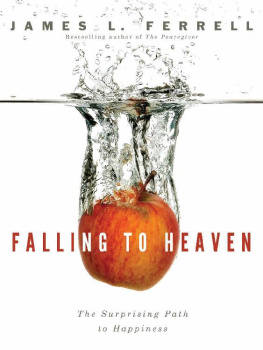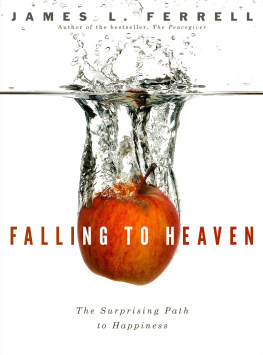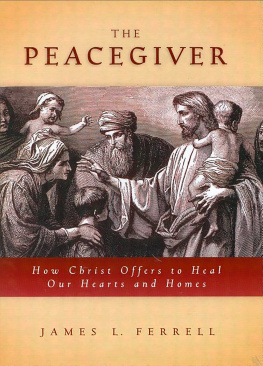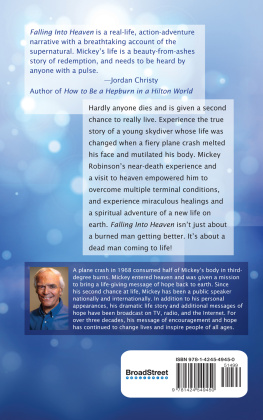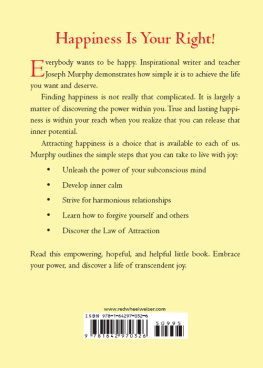2012 James L. Ferrell.
All rights reserved. No part of this book may be reproduced in any form or by any means without permission in writing from the publisher, Deseret Book Company, P.O. Box 30178, Salt Lake City Utah 30178. This work is not an official publication of The Church of Jesus Christ of Latter-day Saints. The views expressed herein are the responsibility of the author and do not necessarily represent the position of the Church or of Deseret Book. Deseret Book is a registered trademark of Deseret Book Company.
Visit us at DeseretBook.com
Library of Congress Cataloging-in-Publication Data
(CIP on file)
ISBN 978-1-60908-900-9
Printed in the United States of America
Publishers Printing, Salt Lake City, UT
10 9 8 7 6 5 4 3 2 1
The Lord upholdeth all that fall, and raiseth up all those that be bowed down.
Psalm 145:14
Table of Contents
A Surprising Truth
The Gift of Guilt
Signs of Up-ness
The Confessional Life
Introduction
In a church meeting I once attended, a visiting speaker opened his remarks with the following question: Do you think Jesus loved himself? Of course he did! he insisted enthusiastically, responding to his own question. How else could he love others so much if he didnt first love himself?
Over the years since, I have been on the lookout for scriptural support for this idea. In all that time, I have yet to find a single verse of scripture that speaks of Jesus self-love. Countless scriptures tell us that he loves his Father and loves us. Indeed, those two themes are apparently among the most important in all the scripture. But that he loves himself? Not even a whisper. It seems that the topic didnt interest him.
Although I have never heard another person in the Church even mention the issue of Jesus self-love, I hear a lot of talk about whether we love ourselves whether we feel good about ourselves, for example, or whether we can forgive ourselves, or accept ourselves. I have wondered whether it is wise and helpful for those who are commanded to follow Jesus in all things to expend our energies trying to secure a self-regard and self-worth that the Lord appears never to have valued. The scripture sometimes cited in favor of such effortsthe commandment to love our neighbors as ourselveshas increasingly become inverted in our modern age to mean that we must love ourselves so that we can love our neighbors. But is this really what Jesus was teaching?
My understanding of this commandment is that we are to feel just as happy for anothers good fortune as we would for our own. It is a description of the kind of love that bound Jonathan to David, even though David would supplant Jonathan, King Sauls heir, from the throne. Whereas envious Saul spent the last decade of his life trying to kill the one who would take the scepter from his house, humble Jonathan symbolically transferred his own kingly raiment to Davidloving him, the scriptures say, as his own soul. This, I believe, is the kind of love Jesus was talking about, which is worlds apart from the idea of an indulgent love of self.
Notwithstanding this, when we feel down, the world urges us to try to feel upto stop being too hard on ourselves, to dwell upon our strengths, and to forgive and love ourselves. By contrast, the scriptures specifically condemn those who become lovers of their own selves.
Whether we are feeling up or feeling down, the scriptures suggest that the path of rescue lies in the one direction our natural-man tendencies keep us from looking. As absurd as it may sound, happiness apparently lies not in our trying to feel better about ourselves but rather through our allowing the Lord to help us see truths that at first might make us feel worse. In these lowest momentsthe moments when we give up resisting what we havent wanted to seewe are finally immersed in the joy we have always sought but have never found, a joy that comes not because we have lifted our hearts but because we have finally allowed them to break.
Perhaps, like me, you have sometimes felt stuckunfulfilled, for example, or complacent, or unhappy, and unable to find a way out of your struggle. Or perhaps you have felt flawed, or forgotten, or unfairly burdened. Maybe you grieve as you find your faith at times waning, or your desire to do good diminishing. Maybe you have concluded that even God cant save you.
Whatever our struggles, a great truth at the heart of the gospel reveals a most surprising path to happiness. The path is always right before us, but it begins in the one place our burdened or complacent hearts are keeping us from looking. Happiness, like heaven, may seem above us, but it turns out that we dont obtain either of them by climbing.
Notes
1. See Matthew 22:39.
2. See 1 Samuel 18:14.
3. Mosiah 18:21. See also 1 Samuel 18:1.
4. Hebrews 13:3.
5. 2 Timothy 3:2.
6. See Luke 17:33.
7. D&C 19:21. See also D&C 6:9; 11:9.
8. Ether 12:27.
9. See Mosiah 3:19.
Part One
A Surprising Truth
Making Sense of Happiness
A man Ill call Jeff Watson stared blankly at his computer screen. The curtains to his home office were drawn tightly shut, the darkened, hemmed-in room mirroring his soul. His wife of eighteen years had taken the children to her parents home for the weekend. He was alone. Terribly and frighteningly alone.
They had finally had the talk he had long run fromthe exchange in which divorce was not only raised as a possibility but the preliminary planning had begun. Who would have the kids? She wanted them. So did he. In the cool arithmetic of those trying to bridle firestorms of emotion, they agreed that they would let the kids choose, off-loading that heart-aching choice to the only people in the family who didnt deserve to have to make it. Jeff wanted desperately to believe that it was a scene from another persons life. But it wasnt. This was his life, and everything he cared about was collapsing all around him.
Jeff confided in me after a sleepless, tear-filled night. His soul struggled so desperately for sustaining breath that he could barely squeeze in words between his heavings. At first, I thought he was gravely ill. No, Jim, he choked, its not that. Its And then my friend started bawling. I had never heard pain like I heard in his anguished, sobbing cries. After my multiple attempts to try to get him to tell me what was wrong, he finally was able to say, Tammys left me, Jim. Its over. Everythingeverythings over. And then the wave of sorrow overcame him again.
I sat in stunned silence, my mind racing to understand what I had just heard. The Jeff and Tammy Watsons of this world dont get divorced. Those of us who were privileged to know them had hope in our own marriages partly because of what we saw in theirs. What I was hearing was impossible.
But sometimes the impossible is whats most true, even when its heartbreaking. I listened as Jeff talked about years spent in secret struggle. What a lonely and difficult thing to suffer in such an outwardly happy way! He spoke of the burden he had long carried of living a hypocritical life, of not loving as he had long preached that we should love, of growing in bitterness even as he professed to forgive. He spoke of the foreboding future he now saw: rumors, innuendo, a release from his Church calling, a possible end to his career. He could barely speak about his children and what this might do to them. Where did I go wrong? he pleaded, more to the universe than to me in particular. What have I done to deserve this?

